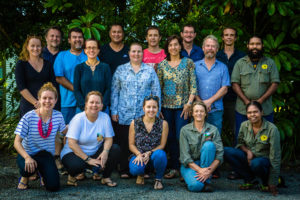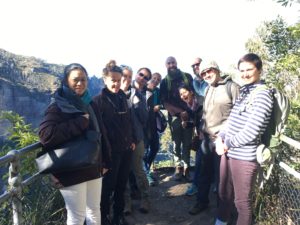Story from Daniel Sprod, Conservation Management
CCNet Australia, working in conjunction with the Protected Areas Learning and Research Collaboration (PALRC), recently completed two trainings in World Heritage Areas: the Daintree and the Blue Mountains in June and July of 2017.
Participants found that the “coaching and supervision from facilitators and the excellent balance of theory and practice” really helped to extend and cement the Open Standards and Healthy Country Planning learning.

Participants at Daintree Open Standards / Healthy Country Planning Training, 2017.
The range of organisations seeking to internalise the process was quite stunning: Durrell Wildlife Conservation Trust from England, GEF-DENR Biodiversity Management Bureau Small Grants Programme in the Phillipines, several national and state Australian government departments, a range of Aboriginal Corporations plus several regional Natural Resource Management bodies.
Similarly, the range of foci was illuminating: Durrell – using the OS to integrate reporting across their global project portfolio, the Torres Strait Regional Authority to develop and implement a language recovery project in the Torres Strait, the Laura Rangers, to plan and manage a project to rediscover the stories contained in rock art across a vast swathe of remote country and Kanyirninpa Jukurrpa to retrofit monitoring indicators into existing plans.
Excitingly, one of the hosts – the Blue Mountains World Heritage Institute – has incorporated the process into new and ongoing projects within a week of the training.

Participants at Open Standards / Healthy Country ¨Planning Training in the Blue Mountains, 2017.
Participants appreciated the interaction within and between groups and individuals as a terrific learning experience as well: “opportunity to talk with trainers about our work/projects”, “learning about the natural and cultural values and meeting others doing similar work around the country”.
As one person put it: “Thank you so much for guiding us through this process so thoroughly, and bringing your wealth of skills experience and knowledge to the group with such good humour and encouraging us to successfully use the techniques in our roles.”
